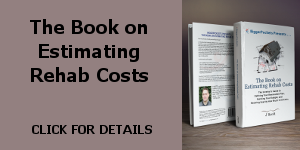Estimating Rehab Costs – Part 1
The most common question I get from new investors is to accurately estimate rehab costs for a flip project. While I could spend many, many articles discussing how to assess rehab costs yourself (and I will, I promise), I wanted to spend some time discussing how a brand new investor might go about getting a rehab estimate without any knowledge of construction.
The first step, once you have a property under contract, is to get a qualified property inspector to visit your property and do a full inspection. Within a day or two of the inspection, the inspector will send you a full report listing all the problem areas of the property. Once you get that property inspection, there are two things you can do to get a reasonable rehab estimate:
- The easiest thing to do is to call a couple General Contractors and let them know that you are planning to purchase a house to rehab, and that you’d like a “pre-purchase rehab estimate.” Let them know that you’re willing to pay a few dollars ($30-50 is pretty standard) and if/when you get the house, you’ll consider them to do the work. The GCs will come out the property, and based on what you tell them needs to be done, they should be able to give you a ballpark estimate (within about 10%) of the total rehab cost.
A couple things to keep in mind when doing this:
- Not all GCs are alike, and some are used to doing high-end renovations while others are used to working with investors. On my first project, I got bids ranging from $30K to $80K (for work that I could probably get done now for $20K) because I was talking to the wrong kind of contractors (they mostly did high-end remodels for homeowners). Try asking other investors who they recommend in your area, or at very least ask the GC if he is accustomed to working on investment rehabs.
- The estimate the GC will give you will include the overhead associated with having him manage the entire project for you. This overhead cost could range anywhere from 5-25%, depending on the GC. If you plan to manage the project yourself (hire your own subcontractors), the total rehab cost could be considerably less than what the GC estimates.
- Now, let’s say that you plan to manage the rehab yourself, and want to get a more accurate estimate of what the costs will be without GC overhead. First, you need to break down the rehab into parts that will be sub-contracted out to individual contractors. Then bring in those individuals for estimates on those parts.
For example, get a plumber to give you an estimate on things like replacing toilets, faucets and hot water heaters. Get a flooring guy to give you estimates on replacing carpet, wood, or vinyl. Because you will likely be hiring these contractors to do the work if you get the project, you shouldn’t expect to have to pay for these estimates.
The big question a lot of people ask is, “What contractors should I be working with?”
On a typical project where, you will want to find/consult with some subset (or all of) the following contractor specialities:
– Plumber
– Electrician
– HVAC
– Painter
– GC/Carpenter
– Flooring
– Roofer
– LandscaperSo, when you create your list of work items (your Scope of Work), break things down into these categories.
One more tip —
If at all possible, you should try to find a great handyman to help you out. A really good handyman can do a lot of the stuff other contractors can do, but at a fraction of he price. For example, you’d probably pay a plumber about $50 to replace a faucet and an electrician about $70 to replace a light fixture; a handyman would probably charge you about $20 for each of these items. In fact, a great handyman can do a lot of things, including basic plumbing, electrical, carpentry, painting, drywall, flooring, etc.
Just don’t get into the habit of trying to use a handyman for things where you need a professional. For example, no matter how good he is, you probably don’t want your handyman to replace your roof or rewire your house (though many will say they can). And for things where finish is really important (like hardwood floor installation), you probably want to entrust the work to a professional in that area, who will be a bit more attentive to detail.




J Scott,
Given the above information and assuming your a new guy, how did you come up with the price to get the property under contract in the first place? When you first started did you do the above steps before making your initial offer? ie..hire inspector and GC
Example: Bank List Price 60K
Your initial offer – 54K is accepted by bank
You have a 10 day due diligence period
During due diligence ( inspection and having GC’s come in ) you realize that the most you can pay for the property is 44k.
Now there will have to be re negotiating with the bank.
From what I’ve read, REO agents don’t like when this sort of thing happens, and it shows them that you’re inexperienced, which will cause them you look less favorably on your future offers.( learned that from an interview with a top REO agent, posted on another BP blog, don’t know if I can post a link so I won’t )
Secondly, when first starting out, did you walk all of the properties that you made offers on?
I know that negotiation is a big part of the game, I just don’t want to make crazy initial offerings and hurt my rep before I have one. I hope this wasn’t answered in another post,I realize your time is valuable.
Thanks in advance !
Norman
Hi Norman,
You’ll most likely want to get the GC into the property BEFORE you make your initial offer. This can be tricky at first, as you’ll be getting rehab estimates on a bunch of properties that you’ll likely never get under contract, but the good thing is that after 3-5 of these pre-purchase estimates, you’ll start to get a feel for how much things cost. Once you have a general feel for how much things cost (i.e., will this be a $5K rehab or a $50K rehab), you’ll be able to start making offers without the pre-purchase estimate, as you’ll have a good enough idea of the costs (to within $5K or so) that you should be able to generate a conservative offer price.
Once you get something under contract, then you’ll definitely want to get a full inspection and then use that to get a very detailed contractor bid (multiple bids, actually).
The whole process is very iterative, and as you go, you’ll learn more and more, and you’re estimates and offers will be more and more accurate.
Does that make sense?
J Scott,
Yes it makes sense, and thanks for the quick reply.
Those first 3-5 pre-purchase inspections will basically be my cost for a crash course in estimating repairs. I’ll just take notes and ask the GC’s a bunch of questions while there doing the inspections. Since the houses will be somewhat similar after those first few I should be able to do an accurate ballpark estimate.( if there is a such thing ..accurate, ballpark 🙂
Thanks,
Norman
Hi, J, do you think an professional inspection is necessary before submitting the offer. Even if you are experienced in pro-estimating the rehab cost, what if you miss something?
Hi Michael,
If you can do a very basic inspection to come up with an estimate (even an estimate with a large range), you shouldn’t need to do an inspection prior to putting in an offer. Just make sure you have a “contingency” in your contract (a contract stipulation that allows you to back out of the deal if you later determine that that the numbers don’t make sense).
After you’ve done a few deals, you’ll start to get good at doing your own inspections and estimates. While you still may miss some small things here and there, that’s why you throw in 5-10% extra into your budget to cover these surprises. For example, in 3-4 houses in a row last year we found burst pipes in the wall after turning on the water for the first (after buying the property). In each case, the fix was less than $1000 and a day or two of effort, which was easily covered by our “surprise budget.”
Of course, if you ever have concerns about potentially expensive repairs (structural, foundation, mold, etc), those are things you should definitely bring in a specialty inspector before you complete the purchase.
J Scott,
I am new to this and still trying to get my head around where is the reahb cost money coming from. If the sells price of the home is $48k and after inspecting the home, it is determined the rehab cost comes to $10k. When you first started out, was this money coming from you or the lender you selected?
Thank you…
Hi Steve –
Depending on the type of loan you get, it may come from the lender, or you may need to provide it yourself. A few years ago, there were plenty of lenders who would lend enough money to purchase the property and rehab the property, and you didn’t really need to come up with any of your own money. These days, after the real estate bubble burst, things have changed a bit, and most lenders will require that you come up with at least 10-20% of the total amount of the costs or purchase and renovation.
So, for a property that you buy for $48K and you need $10K in rehab (from your example above), that’s a total of $58K. Most lenders will require that you come up with between $5800 and $11,600 of that (10-20%) and they’ll lend the rest.
J,
Thanks for the info. I am new to the investing side of real estate but my wife and I have worked in the industry as agents since 2008. I found out about you and your books and website from the BiggerPockets podcast. I just wanted to say thanks and introduce myself. Hopefully you’ll be hearing some success (and failure, I’m sure) noise from me in the future. I’ve just started learning but I am enthralled and truly grateful that investors like you take the time to share your valuable experience! Thanks again, J!
-Todd Garrigus